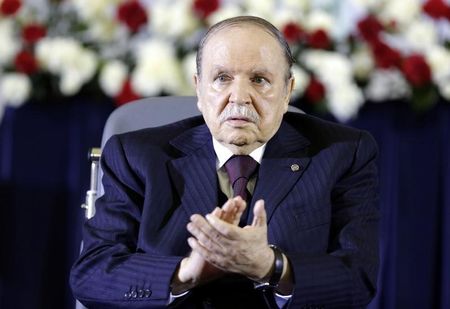By Lamine Chikhi
ALGIERS (Reuters) - President Abdelaziz Bouteflika has signed a decree to curb the presence of Algeria's military intelligence service in public institutions, government sources said, to downgrade his rivals and ensure a smooth transition when he steps down.
Since independence from France in 1962, Algerian politics has often been dominated by an opaque behind-the-scenes power struggle between military and civilian leaders to control branches of North African state's government.
A year ago, Bouteflika began taking steps to ease the military and its DRS intelligence wing out of the political sphere before his re-election to a fourth term this April, analysts said, preparing for his eventual departure from power.
But the veteran of the country's war of independence has stepped up the pace of DRS reform since suffering a stroke last year that left him weakened and raised questions about who will succeed him after 15 years governing Africa's largest country.
"Bouteflika wants the DRS to become more focused on security and to become more professional, this is why his reforms can only be positive," a recently retired DRS officer told Reuters, asking not to be identified because he was not authorised to talk to the media.
The president signed the decree for the DRS to remove their officials from public institutions early in October, according to sources. But it will not appear in the government gazette, the record that makes laws fully official once published.
The DRS, the French acronym of the intelligence agency Department of Intelligence and Security, played a pivotal role in the 1990s, when the Algerian state almost collapsed in a conflict with Islamist militants that killed 200,000 people.
International observers have generally ruled elections in Algeria free and fair and the president and the parliament are chosen at the ballot box. But many Algerians see rival clans of ruling National Liberation Front (FLN) party elites and army generals - generally known simply as "The Power" - have long pulled the strings in politics in backroom deal-making.
Analysts and Algerian sources say Bouteflika has slowly edged the military out of politics, consolidating his own clan's position and transforming Algeria into more of a civilian state in preparation for his stepping down.
TRANSITION TIME?
Stability in Algeria is keenly watched in Washington and European capitals, with Algiers playing a main role in the Western campaign against Islamist militancy in North Africa and the Sahel. Algeria is also a major gas supplier to Europe.
Bouteflika, 77, has rarely been seen in public after recovering from last year's stroke, fuelling speculation in the local media over his ability to finish his term ending in 2019.
Even when a French national was kidnapped and beheaded by a militant group few weeks ago, Bouteflika did not appear in public or make any statement, leaving his prime minister to take the calls from Paris on the case.
Speculation stopped once again when the ageing Algerian leader appeared with Algerian diplomat Lakhdar Brahimi.
The DRS decree is Bouteflika's latest measure to weaken the military role in politics. Few months ago, he dissolved the DRS department in charge of the media, ended its mission to investigate potential corruption and sacked several top intelligence generals.
His drive has reversed the gains the DRS made in the 1990s, when Algeria plunged into chaos amid Islamist strife and the civilian government could no longer rule.
DRS chief Mohamed Mediene became highly influential in deciding political leadership.
With security and stability paramount, the DRS was able to expand its counter-terrorism role into greater influence over politics, media and justice, all in the name of fighting a war.
Bouteflika's decision to put an end to the DRS presence in public institutions, including ministries and state-owned firms, signals that the "terrorist threat against (them) is no longer significant", said one source.

"In the 1990s, public institutions were under terrorist threat, Algiers airport as well as tens of public institutions were targeted," security analyst Anis Rahmani said. "Now the situation has improved to the extent that the DRS presence is no longer needed."
(Writing by Patrick Markey; Editing by Tom Heneghan and Louise Ireland)
